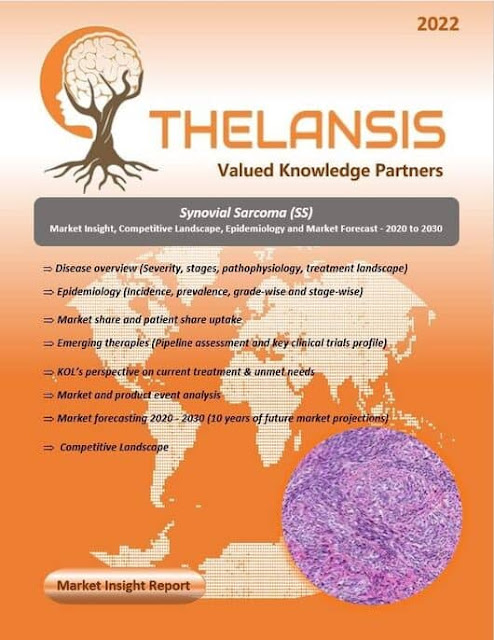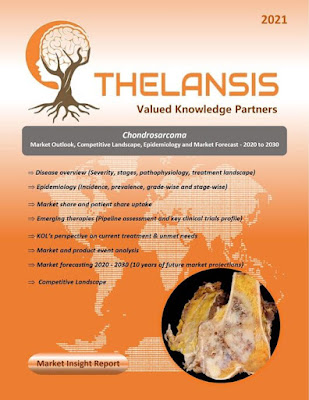Synovial Sarcoma – Market outlook, Epidemiology, Competitive Landscape, and Market Forecast Report – 2020 To 2030
Synovial Sarcoma (SS) is a soft tissue sarcoma that
mimics a benign neoplasm due to its slow growth and distal predisposition. A
slow-growing mass, compression symptoms, or irritation to nearby structures are
all common symptoms of SS. These cancers are well-known for their proclivity
for being misdiagnosed. They've been said to look like arthritis, synovitis,
bursitis, hemangiomas, and hematomas, especially when small calcifications
accompany them. SS affects specific areas, with 60 percent to 70 percent of
cases affecting the lower extremity, and is frequently associated with bursae,
tendon sheaths, and joint capsules. Monophasic and biphasic SS are the two
major subtypes of SS histologically. Monophasic tumors, found in all three of
our patients, are made up of spindled cells and have a better prognosis. They
usually present as smaller masses with no metastases.
The incidence of Synovial Sarcoma (SS) varies from
3.2 to 4.65 cases per million populations in the USA.
The competitive
landscape of Synovial Sarcoma includes country-specific approved and pipeline
therapies. Any asset/product-specific designation or review and Accelerated
Approval are tracked and supplemented with analyst commentary.
KOLs insights of Synovial
Sarcoma across 8 MM market from the center of Excellence/ Public/ Private
hospitals participated in the study. Insights around current treatment
landscape, epidemiology, clinical characteristics, future treatment paradigm,
and Unmet needs.
Synovial
Sarcoma Market
Forecast: Patient Based Forecast Model (MS. Excel Based Automated
Dashboard), which Data Inputs with sourcing, Market Event, and Product Event,
Country specific Forecast Model, Market uptake and patient share uptake,
Attribute Analysis, Analog Analysis, Disease burden, and pricing scenario,
Summary, and Insights.
S. No Asset Company Stage
1 CFT8634 C4
Therapeutics Inc Phase 2
2 Ramucirumab Eli
Lilly and Company Phase 2
3 FHD-609 Foghorn
Therapeutics Inc. Phase 1
4 OTSA101-DTPA-111In OncoTherapy
Science, Inc. Phase 1
5 ADP-A2M4 Adaptimmune Phase 2
6 AL3818 Advenchen
Laboratories, LLC Phase 3
7 Tazemetostat Epizyme,
Inc. Phase 2
8 Itacitinib Incyte
Corporation Phase 1
9 CAB-AXL-ADC BioAtla,
Inc. Phase 2
10 CAR-T cell immunotherapy Shenzhen
BinDeBio Ltd. Phase 2



Comments
Post a Comment